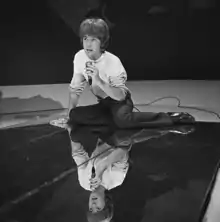David Garrick (singer)
David Garrick (12 September 1945 – 23 August 2013) was an English singer who was best known for his 1966 pop hit single, "Dear Mrs. Applebee".[1]
David Garrick | |
|---|---|
 Garrick in 1967 | |
| Background information | |
| Birth name | Philip Darrell Core (some sources list his birth name as Darrell Philip Corré) |
| Born | 12 September 1945 Liverpool, England, UK |
| Died | 23 August 2013 (aged 67) Wirral, England, UK |
| Genres | Rock, pop rock |
| Instruments | Vocals |
Biography
Born Philip Darrell Core, as a teenager Garrick sang in a Liverpool church choir, but became interested in opera and succeeded in obtaining a scholarship to train as an opera singer in Milan, Italy. He returned to Liverpool after two years, where he was frequently found at the famous Cavern Club and once improvised an opera excerpt of Pagliacci, rendering him the surname "The Opera Singer" at the club. The Kinks' manager, Robert Wace, invited Core to come to London to record a first single. He picked the name "David Garrick" as stage name, after the famous 18th-century actor and playwright.[2]
Garrick's first two singles, "Go" (1965) and "One Little Smile" (1965), were unsuccessful. In 1966 he released a cover of the Rolling Stones song "Lady Jane", which had some airplay in the UK, reached number 28 on the UK Singles Chart,[3] but peaked at number 5 in the Netherlands. Later that year he covered "Dear Mrs. Applebee", a relatively unknown American song first recorded by Flip Cartridge,[4][5] and written by Billy Meshell and Phil Barr.[6][7] Garrick's version was a hit in Germany (number 1),[8] in the Netherlands (number 3),[9] and Flanders (number 3),[10] but got no higher than number 22 on the UK chart.[3]
In following years, Garrick released numerous singles and albums but never again achieved any notable success. In Germany he had two minor hits in 1967.[11] In 1970 he went to live in South Africa and Egypt for some years. In the 1990s, he returned to Europe to attempt a comeback mainly focused in Germany. In 1999, he recorded "Apassionata", produced by Mal Jefferson at Mastersound Studios, Southport, which was released on Prestige Records. He continued throughout the 1990s to perform at festivals in Germany, where he had a loyal following.
Discography
Albums
- A Boy Called David (1967)
- Don't Go Out into The Rain Sugar (1967)
- Blow Up (Live, 1968)
- Apassionata - A Tribute to Lanza (1999)
References
- Spencer Leigh (8 September 2013). "David Garrick: Singer whose career included Sixties hits as well as opera at the Cavern – Obituaries". London: The Independent. Retrieved 9 September 2013.
- Bruce Eder (12 September 1945). "David Garrick: Biography". AllMusic. Retrieved 7 October 2013.
- Roberts, David (2006). British Hit Singles & Albums (19th ed.). London: Guinness World Records Ltd. p. 222. ISBN 978-1-904994-10-7.
- "Flip Cartridge Plays the Hits | The Hits Just Keep on Comin'". Jabartlett.wordpress.com. 25 April 2005. Retrieved 7 October 2013.
- According to The Originals Archived 28 December 2013 at the Wayback Machine "Flip Cartridge" was an alias of co-writer Wilbur (Billy) Meschell.
- "David Garrick – Dear Mrs. Applebee/You're What I'm Living For – Piccadilly – UK – 7N 35335". 45cat. Retrieved 7 October 2013.
- "David Garrick – Dear Mrs. Applebee (Vinyl) at Discogs". Discogs.com. Retrieved 7 October 2013.
- "Charts-Surfer". Charts-surfer.de. Retrieved 7 October 2013.
- "Top 40". Top40.nl. Retrieved 7 October 2013.
- "Ultratop". Ultratop.be. Retrieved 7 October 2013.
- "Please Mr. Movingman" reached No. 25 and "Don't Go Out into The Rain" #26; Günter Ehnert (ed.): Hit Bilanz. Deutsche Chart Singles 1956–1980. Hamburg: Taurus Press 1990, S. 81
- Doc Rock. "July to December". The Dead Rock Stars Club. Retrieved 7 October 2013.
| Wikimedia Commons has media related to David Garrick (singer). |